 Loading paper
Loading paper Printing the watermark for Windows
Printing the watermark for Windows Printing the watermark for Mac OS 9
Printing the watermark for Mac OS 9 Creating your own watermark for Windows
Creating your own watermark for Windows Creating your own watermark for Mac OS 9
Creating your own watermark for Mac OS 9Various Printing Options
Loading paper
Printing the watermark for Windows
Printing the watermark for Mac OS 9
Creating your own watermark for Windows
Creating your own watermark for Mac OS 9
Watermark printing allows you to print a text-based or an image-based watermark on your document.

| Note: |
|
|
Load paper into the printer.
 | Loading Single Sheets of Paper |
 | Access the printer driver software. |
 | Accessing the Printer Software for Windows |
 |
Click the Main tab, then make the Quality Option setting. See the following section for details on the Quality Option settings. See Quality Option See Quality Option
|
 | Make the appropriate Type setting. |
 | Media Type Settings |
 | Make the appropriate Size setting. |
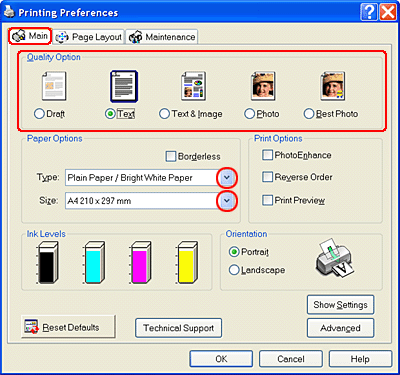
 | Click the Page Layout tab, choose the desired watermark from the Watermark list, then click Settings. |
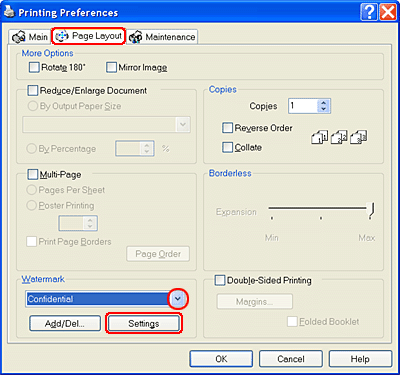
 | Specify the necessary settings for the watermark. You can change the position and size of the watermark by dragging the image within the preview window at the left of the dialog box. |
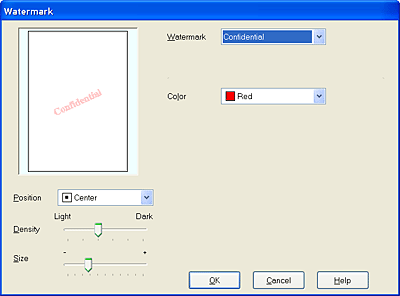
 | Click OK to return to the Page Layout menu. |
 | Click OK to close the printer driver settings dialog box. |
 | Print the data from your application. |
 | Access the Page Setup dialog box. |
 | Accessing the Printer Software for Mac OS 9 |
 | Make the appropriate Paper Size setting. |
 | Click OK to save the settings and close the Page Setup dialog box. |
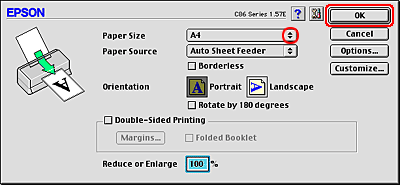
 | Access the Print dialog box. |
 | Accessing the Printer Software for Mac OS 9 |
 | Make the appropriate Media Type setting. |
 | Media Type Settings |
 |
Click the  Layout icon button. Layout icon button.
|
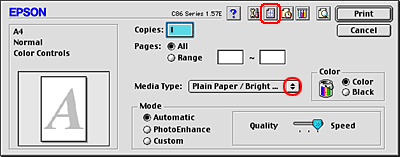
 | Select the Watermark check box in the Layout dialog box, then choose the desired watermark from the Name list. |
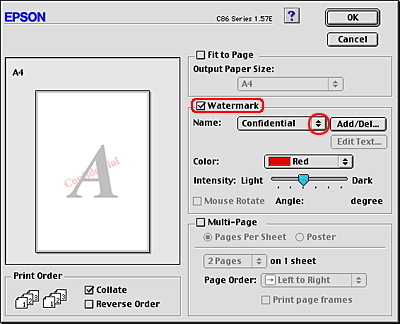
 | Specify the necessary settings for the watermark. You can change the position and size of the watermark by dragging the image within the preview window at the left of the dialog box. |
 | Click OK to save the settings and close the Layout dialog box. |
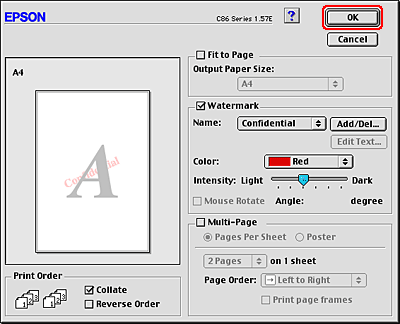
 | Click Print to start printing. |
You can add your own text-based or image-based watermarks to the watermark list.
 | Click Add/Del under Watermark on the Page Layout menu. The following dialog box appears. |
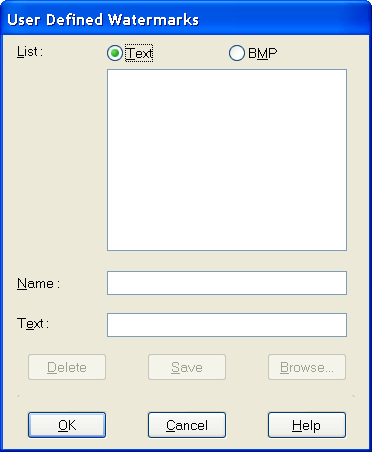
 | To use an image file as a watermark, select BMP. Click Browse to specify the bitmap file you want to use, then click OK. Type a name for your watermark in the Name text box, then click Save. |
To create a text-based watermark, select Text. Type your text in the Text text box. The text that you enter will also be used as the watermark name. If you want to change the watermark name, type a new name in the Name text box, then click Save.
 | Click OK to return to the Page Layout menu. |
 | Click Settings. The following dialog box appears. |
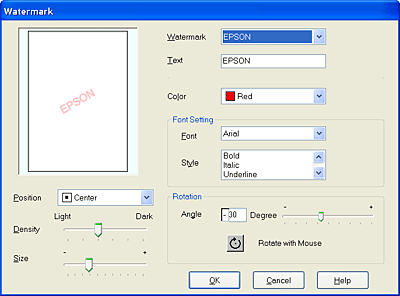
 | Make sure that the appropriate watermark is selected in the Watermark list, then make Color, Position, Density, Size, Font, Font Style, and Angle settings. (For details, see online help.) Your settings are reflected in the display at the left side of the dialog box. |
 | When you finish making settings, click OK. |
You can add your own text-based or image-based watermarks to the watermark list.
 | Click Add/Del beside the Name list. The following dialog box appears. |
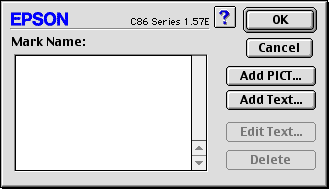
 | To use an image file as a watermark, click Add PICT. Specify the desired image file, then click Open. |

To create a text-based watermark, click Add Text. Type the text in the Text text box, select a font and a text style, then click OK.

 | The image file name or the watermark text appears in the Mark Name list in the Watermark dialog box. To change the name of an image watermark, select it from the list, then type a new name. When a text watermark is selected in the Name list, you can edit the text or change the font and text style by clicking Edit Text. |
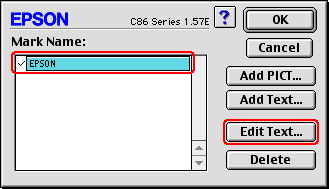
 | Click OK to add your watermark to the Name list in the Layout dialog box. |
 Previous |